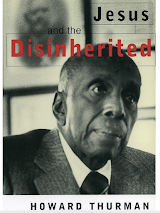
Thurman's life was deep and rich. The grandson of formerly enslaved people, he wrote prolifically and traveled extensively and shaped generations of people including lay people and ministers. His videos are available over on youtube for people like me who are relatively uninformed. There is even a movie about the man.
Most compelling for me is how Thurman describes Jesus of Nazareth in this small volume, how Jesus navigated the perils on the left, the conservative Jewish leaders of the day and their fear of Him upsetting the proverbial apple cart of their faith traditions and their intentions to kill Him, and on the right, the Roman government that was undoubtedly aware of any potential uprising from this religious sect in Galilee.
As Jesus navigated the perils of His day, He reached out and touched and engaged and loved those who were "disinherited" of His day. As a Black man in America, Thurman knew what it was like to live in a land where he and his people were disinherited. Jesus connected with the poor, the prostitutes, sinners, tax collectors, those who were demon possessed, avoided as unclean, the blind, the disabled since birth, women, and others whom society deemed unworthy. He even had a surprising conversation with a woman at a well in the middle of the day when no one else was around. Shameful!
Just the other day, my wife and I had a rich conversation about our church, and who we think are the "disinherited" of our day, and how they are noted in public assemblies. Our church and our denomination are not the only ones who do this. No, many, many do the same.
Who do you think are the "disinherited" of our times? Immigrants, Muslims, people who experience same sex attraction, non-binary individuals, gay couples, people who walk in Gay Pride events, people categorized as LGBTQ, and any number of other people. If we listened closely enough, we can still hear racial slurs toward Hispanic people or Black people or any number of other groups. Watch the news for a couple of hours and there are the perpetrators of violence upon the "disinherited" of our day.
What we do publicly is to declare where we stand. We make declarations both overtly and covertly in public places and spaces, declaring these others as others. Thus, we "otherize" some of God's children who do not walk, talk, live, believe, look, and think like we do. Implicitly, I think, we glorify ourselves as ones who can do the "otherizing" as we point out the "others." We are insulting the "disinherited" of our day. Why would we want to insult someone for whom Christ also died?
This dynamic is very similar to what religious people did when Jesus walked the earth. They "othered" Him as he hung out with "others" such as tax collectors and sinners and any number of other people who found Him and His message compelling. Their list was long.
The irony is that in some of our assemblies we "otherize" people or groups of people and then expect ourselves to have a voice with them. People who are "othered" will not attend our assemblies, or if they do, they will not come for long once they have heard the language. They, I think, will avoid conversations with us.
So, bottom line, Jesus engaged those who were disinherited. I want to live the way Jesus lived. I devote much of my time and energies to fighting for justice for Black farmers. They, Black farmers of our land, are "otherized" by institutions of power and privilege. They get their loans late and less than what they qualify for, they lose their farms and homes when the banks and the local county offices have been working deals behind their backs, they receive loans less frequently and in fewer dollars than do white farmers, and I could go on and on, but you get the drift.
I was once a young person who easily could have been labeled one of the "disinherited" kids of the day: poor, growing up in a single parent family, mother addicted to prescription drugs, a parent who was admitted on two occasions to a mental institution, lived on commodities, received hand me down clothes from well meaning people at church. It was terribly uncomfortable.
Now is not a time to insult people for whom Christ also died. There is no need to use the pulpit as a time and place to label people. Now is not the time to draw distinctions between who "deserves" loans and services for farming, and those who do not, at least based upon the color of their skin. Now is the time and this is the place to engage people in their life journeys. Now is the time to treat people with dignity and respect whether in our churches, our offices, our neighborhoods, our restaurants, or wherever.
Now is not the time to craft smaller tables. Now is the time to build bigger tables. Now is the time open the doors and invite all in to sit with us. Better yet, get to know people on their own turf. Develop respectful relationships with others. It's hard to talk smack about someone you love.
Excuse me, but I'm going to go and hang out with Jesus of Nazareth and Dr. Howard Thurman for a while today.